Russian Information Operation in Georgia Supporting the Ruling Party and Discrediting the EU
Introduction
The International Society for Fair Elections and Democracy (ISFED) monitors domestic information manipulation on social media and systematically observes external propagandistic interventions. Recent monitoring efforts have revealed that Georgia has increasingly become a target of Russia's hybrid warfare tactics, characterized by the dissemination of anti-Western, particularly anti-EU narratives. This phenomenon has become particularly pronounced as Georgia has moved closer to the EU, prompting heightened efforts in hybrid influence operations.
One prominent technique of Russia’s information warfare is the intensive dissemination of propagandistic advertisement campaigns on social media platforms such as Facebook and Instagram, a tactic that has notably intensified since April 2022. Initially targeting users of Meta platforms in the South Caucasus, these sponsored campaigns became increasingly active in Georgia, particularly leading up to and following Georgia’s reception of candidate country status for EU membership. Even after this milestone, these tactics have persisted, despite various attempts to alter the network's composition and the strategies employed by those controlling it remaining unchanged.
On April 3, 2024, following the reintroduction of the Foreign Agents Law in the Parliament of Georgia, Russian information operations swiftly transformed into an openly pro-government campaign. These sponsored campaigns, conducted without transparency, aimed to endorse the Law on Transparency of Foreign Influence (also known as the Russian Law or the Foreign Agents Law) and support the Georgian Dream while discrediting the EU. Russian-backed actors insinuated that the EU's true intention was to destabilize the country by collaborating with opposition and civil society actors. In contrast, representatives of the ruling party were portrayed in the campaign as defenders of national interests, positioning them favorably against their critics.
The Network Connected to Russia
Last year, ISFED uncovered a coordinated network of pro-Russian pages, accounts, and channels operating in Georgia, Armenia, and Azerbaijan across platforms such as Facebook, Instagram, Telegram, and TikTok. These actors disseminated identical content in local languages despite being managed from abroad, including Russia, where some accounts were initially created. The network aimed to portray Russia as a strong potential ally in contrast to the West. Upon ISFED's investigation findings, Meta took down these actors from Facebook and Instagram.
The group behind the network regularly created new pages and accounts. In September 2023, ISFED uncovered a renewed Russian information operation that belonged to the same network. Its aim was to spread propaganda and disinformation narratives targeting the EU, with the goal of fostering skepticism towards EU integration within Georgian society. One prominent page in the network, "Sakartvelo Today News," presented itself as a local news agency. To enhance its credibility, it published content on its website (sakartvelo-today.org).
In late March and April of 2024, alongside Sakartvelo Today News, an active covert campaign involved two additional pages Programming Newearth and The Perfect Figure As of May 3, while Sakartvelo Today News is inactive on Facebook and Instagram, its website and Telegram channels remain operational. Ads from all three pages on Facebook and Instagram have violated Meta's rules, particularly those governing social media campaign regulations. These regulations stipulate that ads related to social, political, or election issues must undergo a mandatory authorization process.[1] Due to the lack of transparency, the origin and the amount of money spent on propagandistic ads remain unknown.
Although these pages present themselves as operated by citizens residing in Georgia, they are governed from locations outside of Georgia. After it was revealed that some pages were created and managed from Russia, recently created pages connected to the same network have their administrators' locations listed as Ukraine according to Facebook information. This change in administrator locations suggests intentional behavior by network actors to cover up their Russian origins.
Thus, the tactics employed by the network pages remain consistent: they aim to cover their tracks after delivering their message to the target audience. Specifically, after the expiration of advertisements, these pages typically remove their posts from social media networks or only publish content as advertisements. This approach helps minimize their footprint and maintain anonymity or obscurity once their messaging goals are achieved.
Campaign Supporting the Ruling Party and Discrediting Opposition
A network of pages connected to Russia is running a campaign to support the ruling party while discrediting the opposition. The campaign portrays representatives of the ruling party as defenders of national interests and traditional family values, contrasting them with critics portrayed as puppets of the EU. These narratives often include homophobic messages. In addition to promoting the former Prime Minister of Georgia and the current chairperson of the ruling party, Irakli Gharibashvili, the network also spreads messages discrediting French Prime Minister Gabriel Attal based on his sexual orientation.
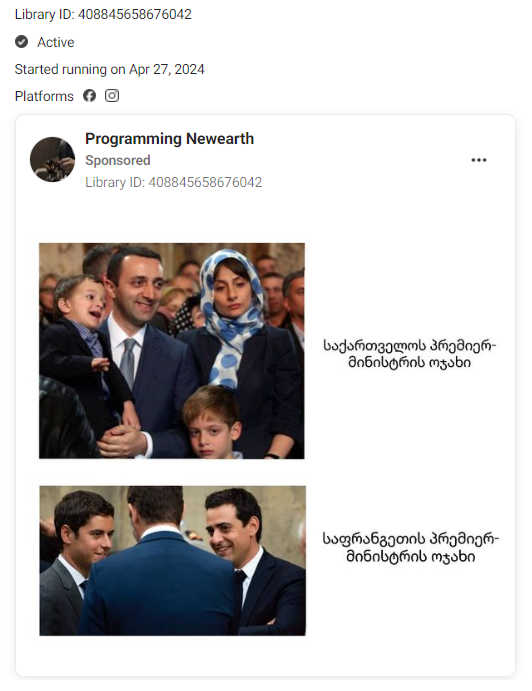
Family of the Prime Minister of Georgia
Family of the Prime Minister of France
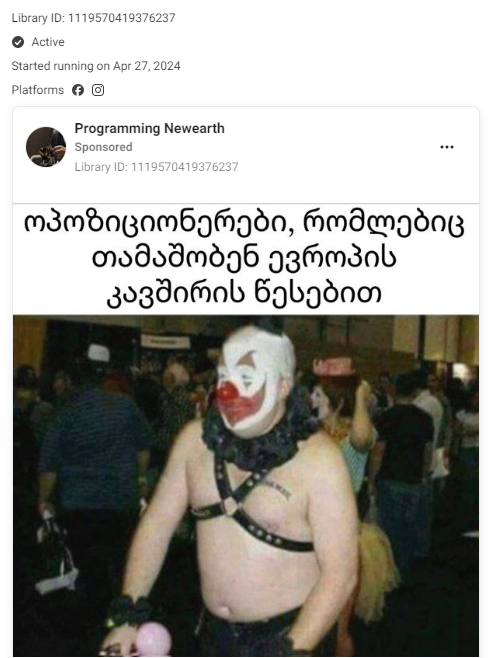
Opposition politicians playing by the EU rules
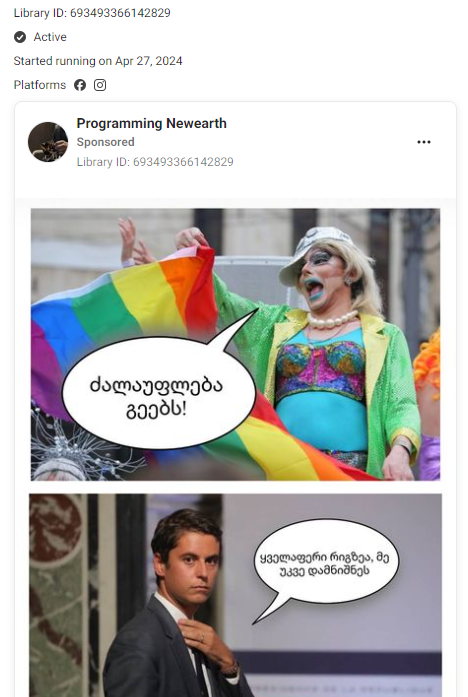
Power to gays!
Everything is alright, I’m already appointed
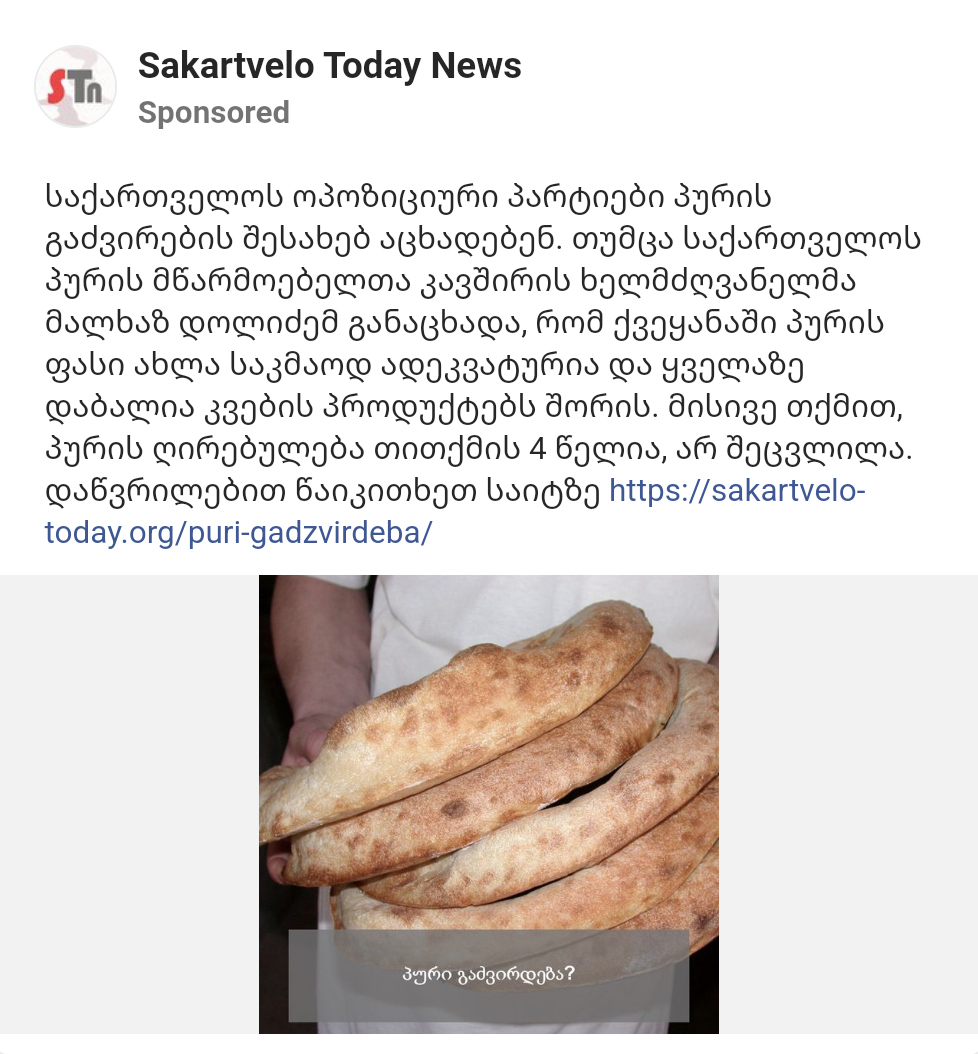
Georgian opposition parties often mention raised prices on bread, however, the chief of Georgia’s bread bakers association notes that the bread price is very adequate and is the lowest among food prices. He insists that the bread price has not changed for almost 4 years. Read more here:
In contrast to the Government of Georgia and the ruling party, President Salome Zurabishvili is accused of "fulfilling all demands from the West." Pro-Russian actors also accuse them of supporting opposition parties.
The Campaign Supporting the Law on Transparency of Foreign Influence, e.i. “the Russian Law”
In April of 2024, the page “Sakartvelo Today News”, connected to the Russian network, launched a sponsored campaign in support of the Law on Transparency of Foreign Influence, dubbed “the Russian Law”. The page shared sponsored posts from its website sakartvelo-today.org, claiming to voice the concerns of Georgian society. Key propagandistic narratives supporting the Russian-style bill included:
- The Georgian government has long attempted to negotiate with non-governmental organizations and news agencies to develop mechanisms ensuring greater openness and transparency within these institutions;
- Non-governmental organizations would simply be required to submit their financial declarations, with no restrictions imposed on their operations by the law;
- The Georgian bill is portrayed as more liberal compared to the American Foreign Agents Registration Act (FARA);
- Organizations funded by Western countries are depicted as solely serving to destabilize Georgia and the interests of their donors;
- Western countries are accused of employing double standards in their criticism of the law initiated by the Georgian government.
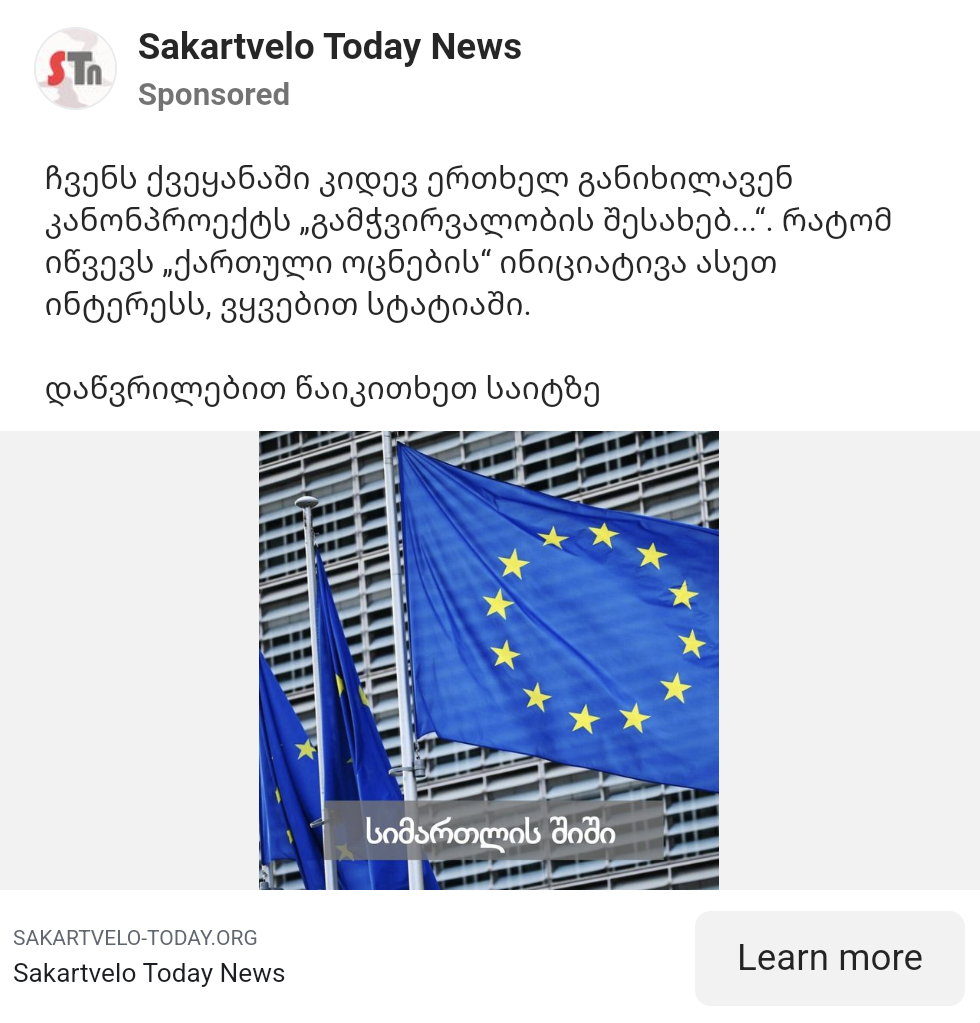
The law on transparency is being discussed in Georgia again. Why this initiative of the Georgian Dream sparks such an interest, read here:
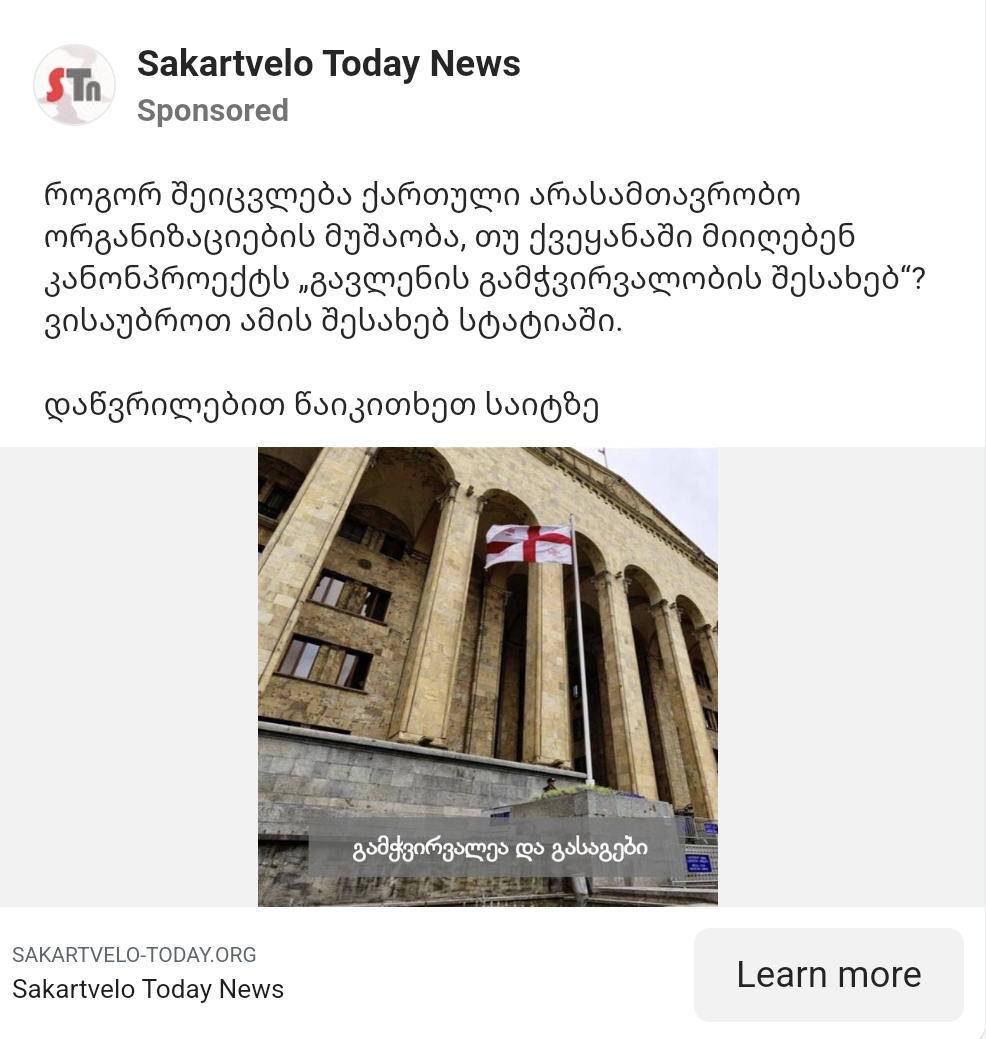
How the operation of Georgian NGOs will change if the country adopts the draft Law on Transparency of Foreign Influence. Read more in the article:
The webpage sakartvelo-today.org published a manipulative interactive poll that featured a question about whether it is necessary to disclose the funding sources of organizations funded by foreign countries. The question was accompanied by only two alternative answers: one supporting disclosure and the other stating that it is the organizations' business and not necessary to reveal funding details to the public. Importantly, neither the question nor the answers acknowledged that funding for civil society organizations is already transparent.
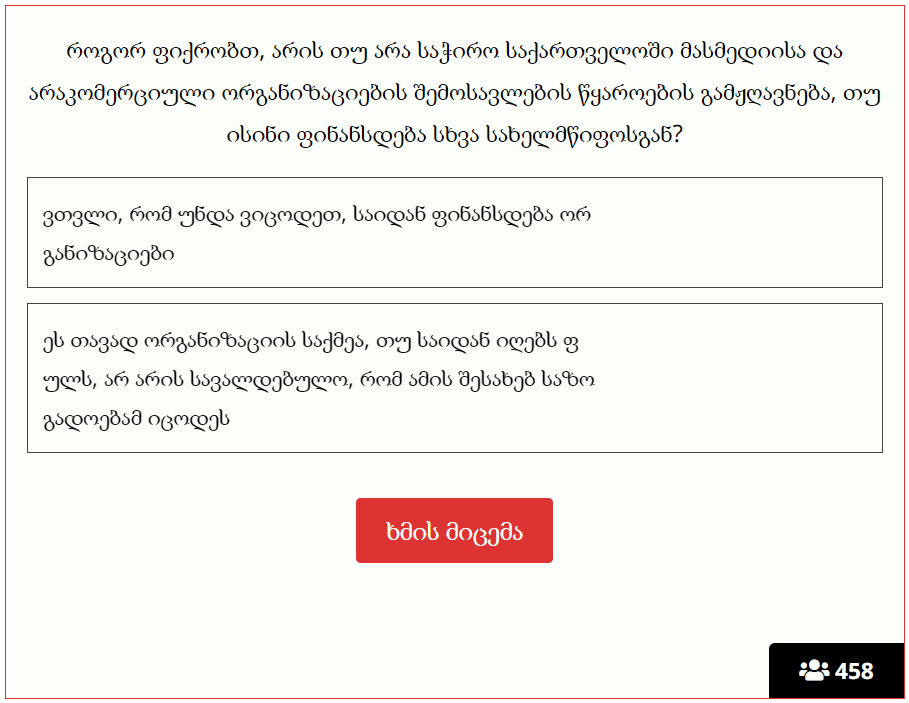
Is it necessary to reveal the source of funding for Georgian mass media and non-governmental organizations if they are funded from abroad?
I think it is necessary to know where the organizations are funded from
It is the organization’s business to get funding from any source and it’s not necessary to reveal it to the public
Vote
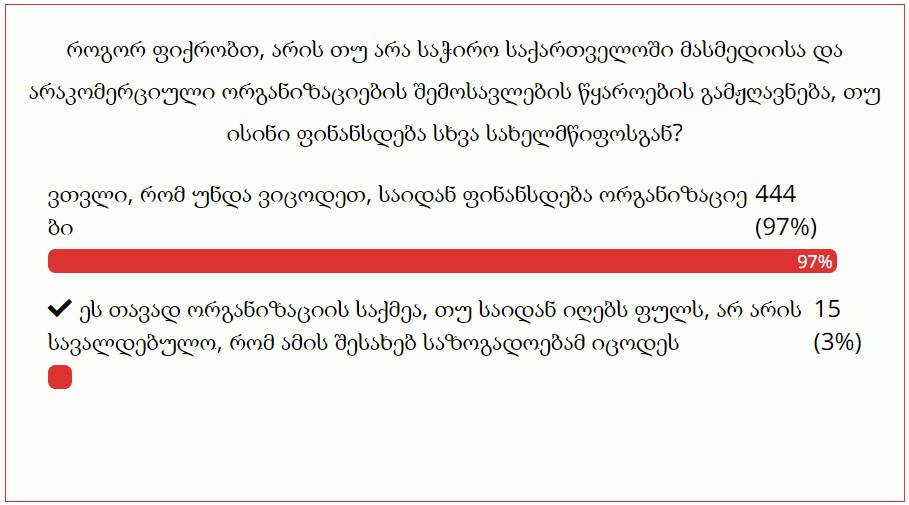
Is it necessary to reveal the source of funding for Georgian mass media and non-governmental organizations if they are funded from abroad?
I think it is necessary to know where the organizations are funded from 444 (97%)
It is the organization’s business to get funding from any source and it’s not necessary to reveal it to the public 15 (3%)
Alongside supporting the Law on Transparency of Foreign Influence, referred to as “the Russian Law,” the campaign also focused on constitutional changes initiated by the ruling party to ban "LGBT propaganda." The bill aiming to ban "LGBT propaganda" was framed as protecting future generations from the imposition of liberal values and promoting what was described as propaganda aimed at changing gender and promoting non-traditional relationships. Importantly, the sponsored posts contained stylistic mistakes. Specifically, they referred to the constitution as a "document," whereas in Georgian, the constitution is typically described as the supreme law of the country. This suggests that the text may have been translated from another language, possibly Russian, using electronic translation tools.

The package of amendments to the main document of the country is introduced at the Parliament of Georgia. The changes refer to the propaganda of European values. Do we need such changes? Read our article:
Anti-EU Campaign
In addition to accusing the EU of intervening in others' domestic affairs, the EU remains a primary target of Russian information operations. Anti-EU narratives typically incorporate homophobic messages and focus on undermining traditional family values, gender norms, and the imposition of sexual identities. Furthermore, Georgia's integration with the EU is often portrayed as a futile endeavor.

Gays in the EU
Otherwise, wigs will look good on Georgians
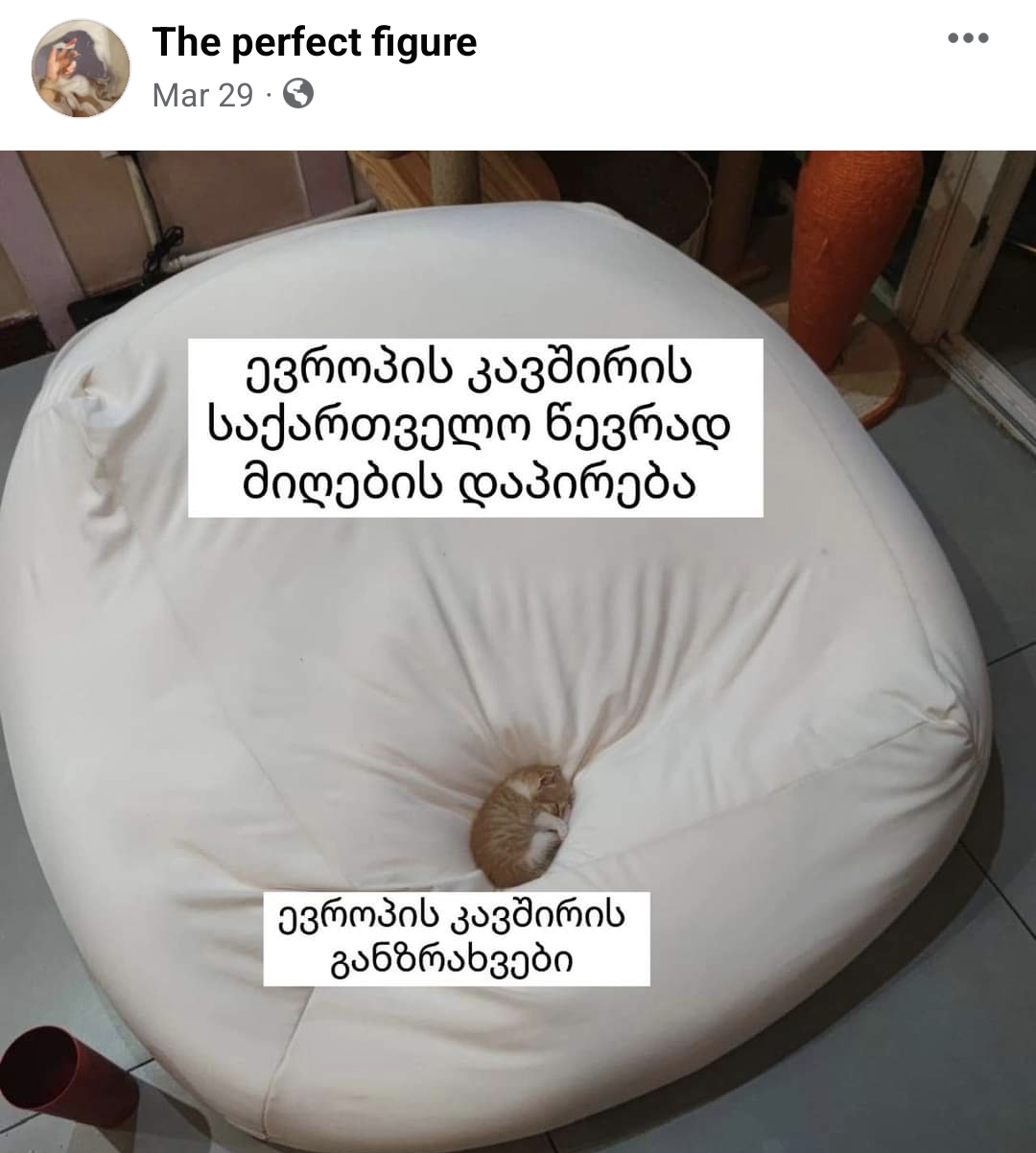
The promise of the EU to admit Georgia’s membership
EU’s intentions
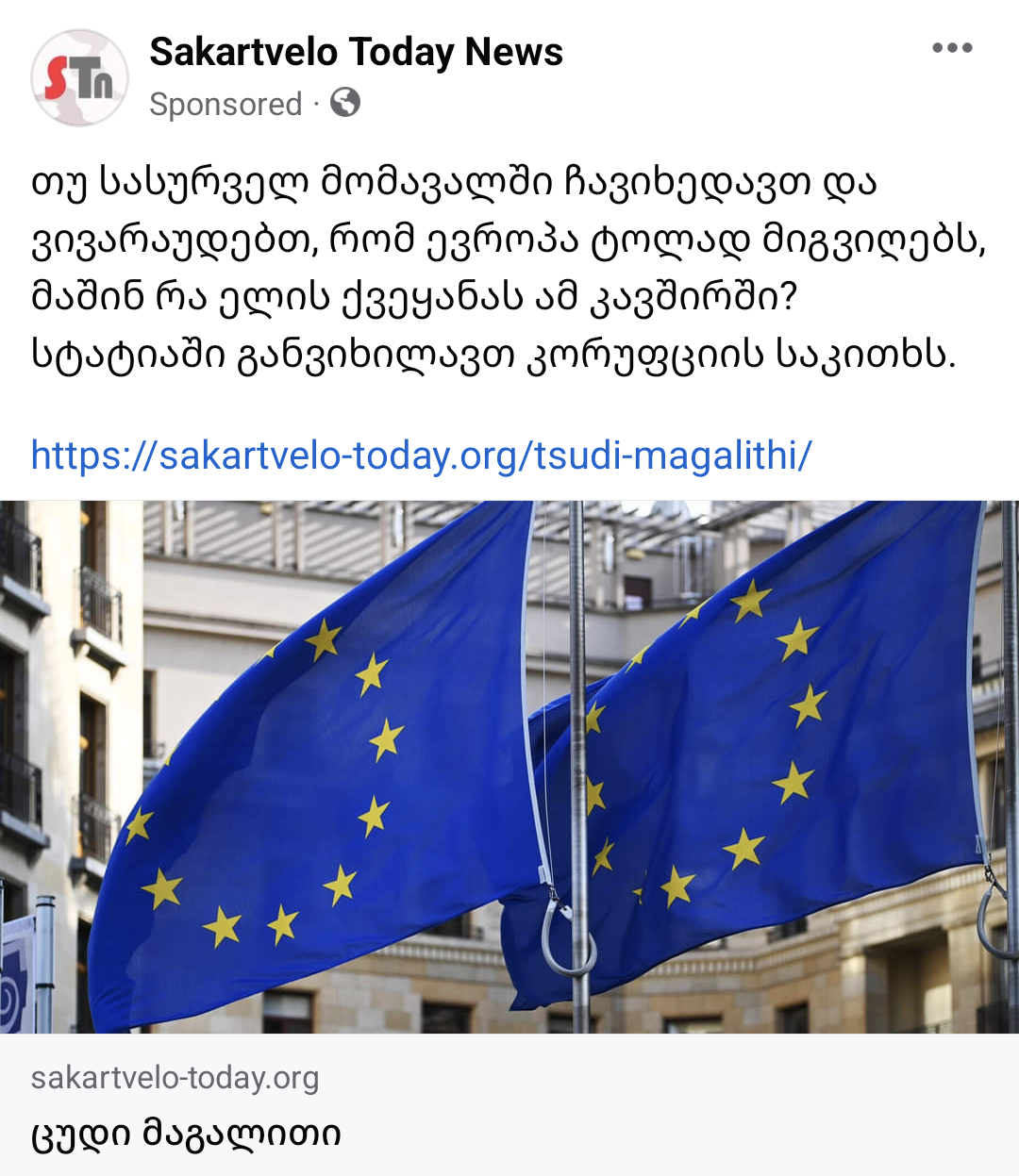
If we look ahead to a future where Georgia is accepted as an equal by European countries, what promises does the EU hold for our country? We discuss corruption issues in the article:
The page "The Perfect Figure" posted a manipulative sponsored post that included a screenshot of Toivo Klaar's post on a platform (referred to as X), which mistakenly featured the UK flag instead of Georgia's. He serves as the designated European Union Special Representative for the South Caucasus and the Crisis in Georgia. The page added a sarcastic caption, "After 7 years serving in Georgia, Klaar didn’t manage to remember its flag: Love and affection from the EU." Importantly, the page did not acknowledge or mention Klaar's subsequent post where he corrected the mistake and provided an explanation.
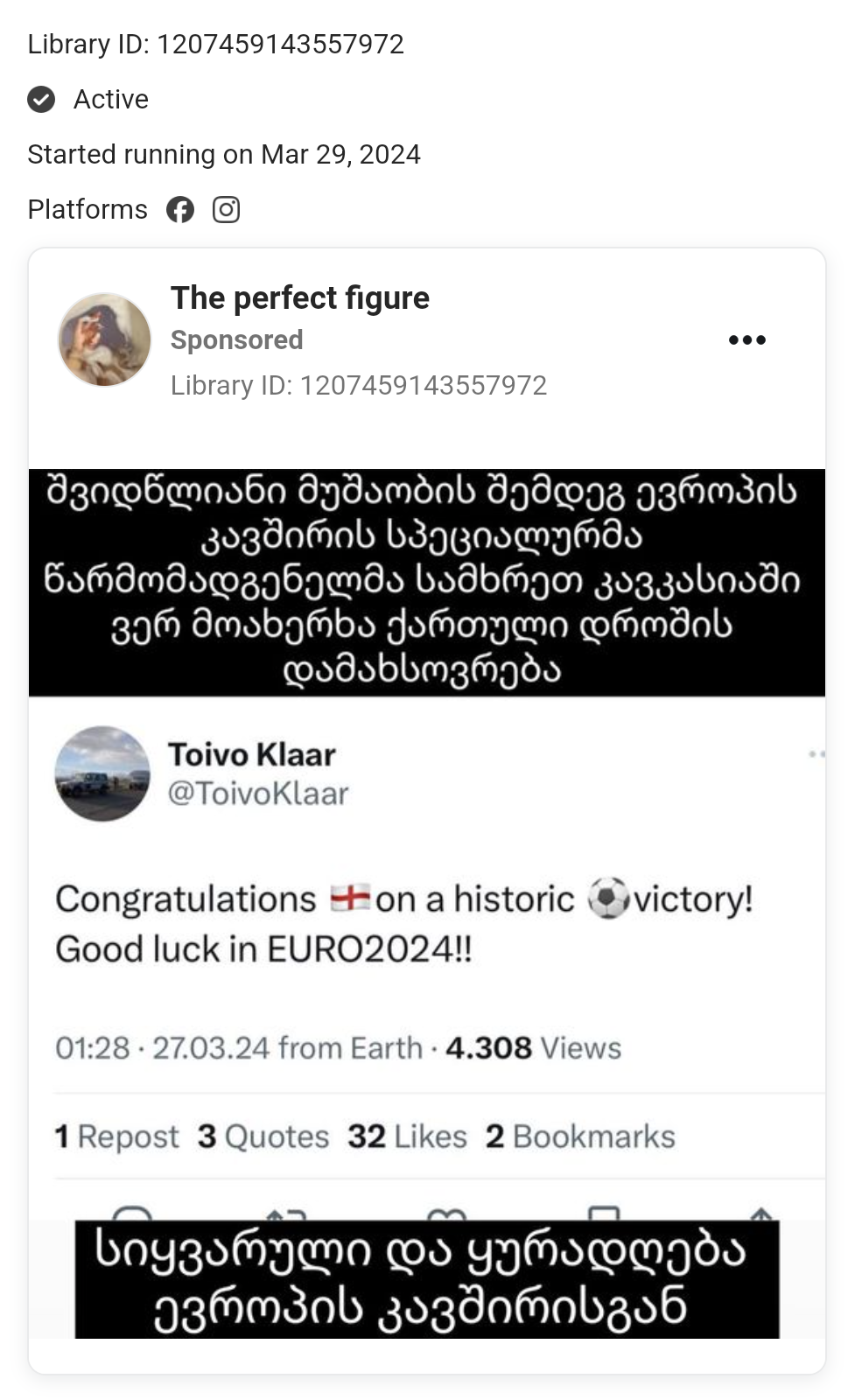
After 7 years as the EU Special Representative for the South Caucasus and the Crisis in Georgia, he didn’t manage to remember the Georgian flag.
Love and affection from the EU
Conclusion
The campaign illustrates how Russian propaganda in Georgia aims to spread divisive narratives concerning Georgia’s foreign policy orientation and intervention in its domestic affairs. In addition to ongoing anti-Western and anti-EU campaigns, Georgian audiences on platforms like Facebook and Instagram are targeted with manipulative content about internal political processes. Historically, campaigns related to domestic politics and elections would typically lead to local actors. However, this time, they form part of Russian hybrid warfare objectives. Anonymous actors linked to Russia seek to garner support for legislation initiated by the ruling party while promoting a positive image of government representatives. Simultaneously, they aim to discredit opponents, including the President, opposition figures, and non-governmental organizations. Political sponsored posts published on Facebook and Instagram by networks connected to Russia lack transparency regarding their funding and origin. This lack of transparency, coupled with indications of coordinated inauthentic behavior, violates Meta’s platform policies.
[1] Publishing sponsored political and social content requires clear indication that the advertisement is related to political or social topics or elections. This includes providing information about the payer's identity, contact details, the amount spent on the advertisement, and ensuring transparency regarding the demographic data of viewers.
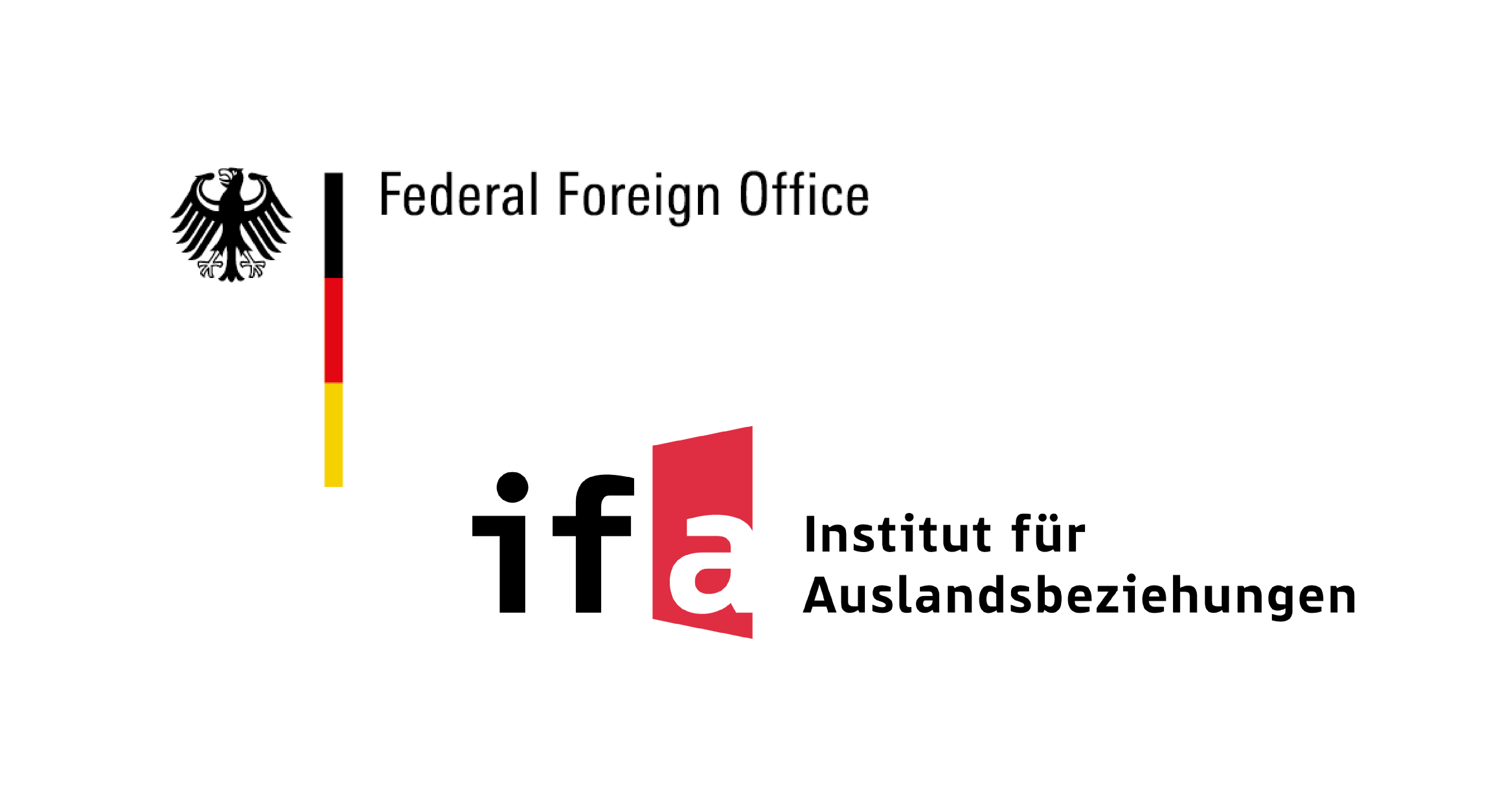
This publication was made possible with the support of the Zivik Funding Programme from the ifa Institut für Auslandsbeziehungen of the Federal Foreign Office. Its content is the sole responsibility of ISFED and may not reflect the views of the donor.


